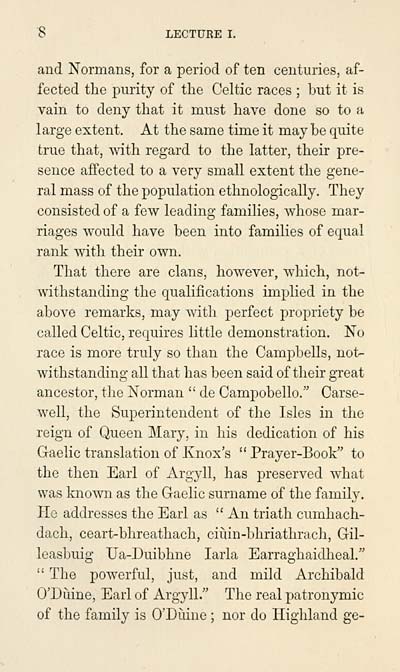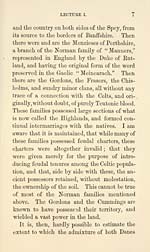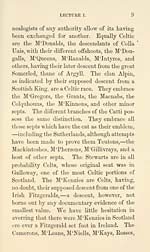Blair Collection > Celtic gleanings, or, Notices of the history and literature of the Scottish Gael
(20)
Download files
Complete book:
Individual page:
Thumbnail gallery: Grid view | List view

'8 LECTURE I.
and Normans, for a period of ten centuries, af-
fected the purity of the Celtic races ; but it is
vain to deny that it must have done so to a
large extent. At the same time it may be quite
true that, with regard to the latter, their pre-
sence affected to a very small extent the gene-
ral mass of the population ethnologically. They
consisted of a few leading families, whose mar-
riages would have been into families of equal
rank with their own.
That there are clans, however, wdiich, not-
withstanding the qualifications imjjlied in the
above remarks, may with perfect propriety be
called Celtic, requires little demonstration. No
race is more truly so than the Campbells, not-
withstanding all that has been said of their great
ancestor, the Norman " de Campobello." Carse-
well, the Superintendent of the Isles in the
reign of Queen Mary, in his dedication of his
Gaelic translation of Knox's " Prayer-Book" to
the then Earl of Argyll, has preserved what
was known as the Gaelic surname of the family.
He addresses the Earl as " An triath cumhach-
dach, ceart-bhreathach, ciuin-bhriathrach, Gil-
leasbuig Ua-Duibhne larla Earraghaidheal."
" The powerful, just, and mild Archibald
O'Duine, Earl of Argyll." The real patronymic
of the family is O'Duine ; nor do Highland ge-
and Normans, for a period of ten centuries, af-
fected the purity of the Celtic races ; but it is
vain to deny that it must have done so to a
large extent. At the same time it may be quite
true that, with regard to the latter, their pre-
sence affected to a very small extent the gene-
ral mass of the population ethnologically. They
consisted of a few leading families, whose mar-
riages would have been into families of equal
rank with their own.
That there are clans, however, wdiich, not-
withstanding the qualifications imjjlied in the
above remarks, may with perfect propriety be
called Celtic, requires little demonstration. No
race is more truly so than the Campbells, not-
withstanding all that has been said of their great
ancestor, the Norman " de Campobello." Carse-
well, the Superintendent of the Isles in the
reign of Queen Mary, in his dedication of his
Gaelic translation of Knox's " Prayer-Book" to
the then Earl of Argyll, has preserved what
was known as the Gaelic surname of the family.
He addresses the Earl as " An triath cumhach-
dach, ceart-bhreathach, ciuin-bhriathrach, Gil-
leasbuig Ua-Duibhne larla Earraghaidheal."
" The powerful, just, and mild Archibald
O'Duine, Earl of Argyll." The real patronymic
of the family is O'Duine ; nor do Highland ge-
Set display mode to: Large image | Transcription
Images and transcriptions on this page, including medium image downloads, may be used under the Creative Commons Attribution 4.0 International Licence unless otherwise stated. ![]()
| Early Gaelic Book Collections > Blair Collection > Celtic gleanings, or, Notices of the history and literature of the Scottish Gael > (20) |
|---|
| Permanent URL | https://digital.nls.uk/76268964 |
|---|
| Description | A selection of books from a collection of more than 500 titles, mostly on religious and literary topics. Also includes some material dealing with other Celtic languages and societies. Collection created towards the end of the 19th century by Lady Evelyn Stewart Murray. |
|---|
| Description | Selected items from five 'Special and Named Printed Collections'. Includes books in Gaelic and other Celtic languages, works about the Gaels, their languages, literature, culture and history. |
|---|

